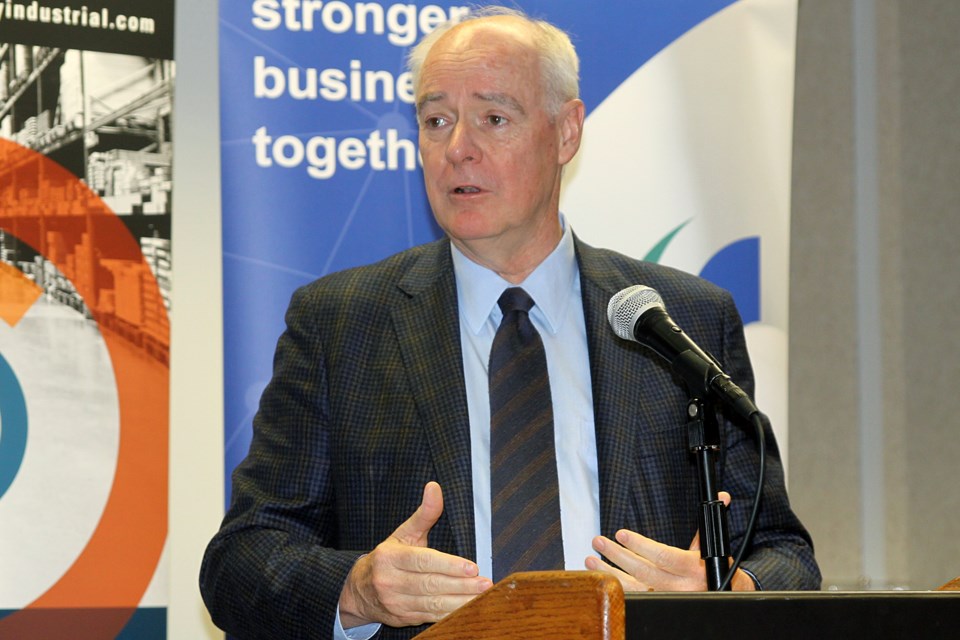THUNDER BAY - Perrin Beatty, president & CEO of the Canadian Chamber of Commerce, was the keynote speaker at the Thunder Bay Chamber of Commerce Chair’s Luncheon & AGM held today, where he addressed “Canada’s economy after COVID – What comes Next?”.
“I don’t have to tell any of you that Canadian businesses are facing a lot of issues. It’s no overstatement to say that we’re coming together at a time of uneasy and relentless transition, with each of us being caught in the same social and economic no-mans-land,” said Beatty.
“We’re entering the third year of the pandemic and we’re still somewhere in-between lockdown and recovery. We’ve made good progress on vaccinations and boosters, and there’s cause for hope that life will get back to normal. But the Omicron variant wave and vaccine hesitancy by a small but significant portion of our population undermine our recovery.”
According to Beatty, labour and supply chain issues are more serious than generally believed and will dominate the short economic outlook
“We’ve seen a great deal of self congratulations over the fact that Canada has recently returned to the level of employment that we saw before the pandemic started,” said Beatty.
“Now while we can all agree that that is an important milestone that addresses the temporary nature of the pandemic, we should not forget the structural deficit of our labour market in 2019 before the pandemic even struck.”
Beatty also addressed supply chain shortages which are present in every sector across every region in the country. Beatty attributed the issues with supply chains to the pandemic, rising shipping costs, and shipping delays in both source countries and receiving countries.
“Here at home the issues have been significantly deepened by COVID-related absences in the workforce and by the devastating flooding in British Columbia, but we have structural issues in play as well,” said Beatty.
“Our port and rail capacity has been unable to keep pace with our business growth,which creates a serious limitation to our future growth.”
Beatty also addressed the debt burden caused by the pandemic, which is projected to rise to $1.4 trillion over the next 5 years, a rise he says would have been unimaginable just two years ago.
“In addition, economic activity still hasn’t recovered in many sectors. Countless Canadian companies, particularly our small businesses, will require assistance to recover. We must never let government officials forget that our businesses closed their doors to keep Canadians safe from COVID,” said Beatty.
“At the Canadian Chamber, we’re pressing for debt relief for those businesses whose loans are coming due. The time’s not yet right for repayment and we see this as a key issue for this period of transition from COVID.”
Beatty says the biggest issue we’ll face collectively moving forward is addressing the weakened economy after COVID ends or becomes endemic.
“It’ll come as no surprise to any of you that Canada has longstanding fundamental problems that hold us back from growing our economy. These problems have not magically disappeared during COVID-19. In many ways, they’ve in fact become exacerbated,” said Beatty.
“Through the last election, the speech from the throne, and the fall economic update, it’s become clear that our political leaders need to focus much more closely on these issues. I don’t need to tell businesspeople that we can’t borrow our way to prosperity, nor should we confuse government spending with actual economic growth.”
Beatty asserts that our political leaders cannot and should not want to go back to where we were pre-pandemic.
In order for Canada to get its economic fundamentals right, Beatty says it needs to support its small businesses, improve its infrastructure, grow its workforce, ensure that the Canada Free Trade Agreement covers all sectors of the economy, and no longer delaying modernization of the Canadian tax system.
